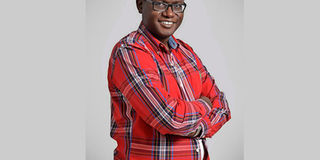Kingston Ogango: He lives and breathes mentorship

Kingston is serving as the head, Alpha East Africa. PHOTO| COURTESY
What you need to know:
- A mentor is someone who has gone through real testing of life to be entrusted to share the lessons with others.
- We should not become dead seas by withholding the skills, knowledge and the wisdom of age and experience that we have learned.
- We all need mentors. Mentors need mentors too. Do away with the know-it-all mentality.
Kingston Ogango Ombisa, 47, is a mentor and life coach with Summit Center of Leadership. Kingston, currently serving as the head, Alpha East Africa, asserts that mentorship is the tool for raising the next generation.
What is mentoring?
Mentoring means you, being at a high level either in terms of age, skills, experience or knowledge helping someone of less experience, knowledge, age or skills to explore and grow into what they ought to be. It is working with someone else in order for them to learn from you and become better or sharpen their current skills or knowledge.
What examples of mentorship relationships exist?
Mentorship is broad and can be formal or informal. Example of mentorship relationships includes parenting, teaching, peer mentoring, career mentoring, and even group mentoring. Peer mentorship is learning from the other, for example when two CEO’s of different companies meet for coffee, they are learning from one another and sharpening each other’s skills and knowledge.
How did you get into mentoring?
I have always been in leadership or management positions, from being a prefect in school to leading a youth group in college. In these leadership positions, people approached me for guidance or counsel.
This made me seek to further sharpen my skills and I was fortunate enough to receive mentorship from someone I greatly admired and looked up to. I am a Christian too and at one time, during a leadership workshop God prompted me to raise leaders, by mentoring them. At the end of this training, I had drafted the curriculum for a mentorship program, which led to the founding of the Summit Center for Leadership.
What does mentorship entail?
Mentorship is deliberate, intentional and interactive. One of the important things I learned from my first mentor, the late Dr. Tokunboh Adeyemo, was reading. He was a voracious reader who greatly impacted me. From him, I learned that leaders read and that mentorship entails broad reading, learning, transfer of knowledge and sharing. I committed to start reading a minimum of one book per month and eventually grew to reading two or three books per month.
Why is mentoring important?
We are not supposed to hoard what we learn. We are supposed to be conduits and pass on what we have learned to other people. If you have been mentored, mentor others, when you learn, pass on the knowledge to someone else. Mentoring is important for one’s growth, legacy and for succession purposes.
Why do you say that mentorship is the tool for raising the next generation?
When we have leaders not willing to retire, it means that they have not mentored other people. We should not become dead seas by withholding the skills, knowledge and the wisdom of age and experience that we have learned. It is through mentorship that we can raise the right leaders for the next generation. A lost generation means that the previous generation is not passing on lessons. Vices thrive because of what has been passed on by the previous generation.
What are some of the challenges you face as a mentor?
Mentoring means a readiness to walk with someone else. It therefore requires patience and sacrifice and involves the use of one’s resources, both time and monetary, and this can be a challenge.
Mentorship relationships can be abused as well, so there is need to set clear boundaries and understanding and to uphold mutual respect. Mentorship across the genders for example can be tricky, because male female relationships have their own dynamics.
What has been the biggest mentoring lesson for you?
Mentoring my own sons, who are 20 and 15, has been the biggest lesson and most testing. This is because I have to walk my talk, every day as my sons observe and challenge me.
Should one seek mentorship or should a mentor approach them and offer to mentor?
It can be either way, though in most situations, a mentee identifies a mentor. Parenting for example comes with the mentorship responsibility.
Why is mentorship not happening in a large scale across all spheres?
We are innately selfish and mentoring is time consuming. From a biblical context, one of the greatest mentors was Jesus, who, in the three years of active ministry, mentored only twelve followers. He was strategic and intentional and today, thousands of years later, we see the legacy of his mentorship.
How does one become a mentor?
A willingness to share their life, someone who is ready to be committed to walking with someone else is how mentorship starts. A mentor is someone who has gone through real testing of life to be entrusted to share the lessons with others. I encourage the older people to be open to help the younger people; not to write them off even when they behave different.
How can one identify and approach a mentor?
It will be someone you admire, respect and someone you will give the permission to speak into your life. I would encourage young people not to dismiss the older people, because some wisdom comes with age.
A take away thought about mentorship?
We all need mentors. Mentors need mentors too. Do away with the know-it-all mentality. Remember, it takes just one person to make a difference and cause a ripple effect.





